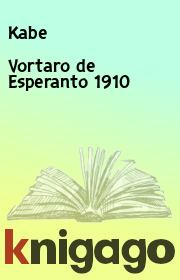Roberto ía - Esperanto and Its Rivals: The Struggle for an International Language
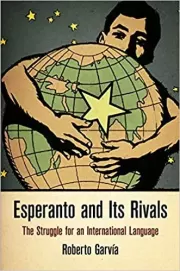 | Название: | Esperanto and Its Rivals: The Struggle for an International Language |
Автор: | Roberto ía | |
Жанр: | Старинная литература | |
Изадано в серии: | неизвестно | |
Издательство: | неизвестно | |
Год издания: | 2015 | |
ISBN: | неизвестно | |
Отзывы: | Комментировать | |
Рейтинг: | ||
Поделись книгой с друзьями! Помощь сайту: донат на оплату сервера | ||
Краткое содержание книги "Esperanto and Its Rivals: The Struggle for an International Language"
The problems of international communication and linguistic rights are recurring debates in the present-day age of globalization. But the debate truly began over a hundred years ago, when the increasingly interconnected world of the nineteenth century fostered a desire for the development of a global lingua franca. Many individuals and social movements competed to create an artificial language unencumbered by the political rivalries that accompanied English, German, and French. Organizations including the American Philosophical Society, the International Association of Academies, the International Peace Bureau, the Comintern, and the League of Nations intervened in the debate about the possibility of an artificial language, but of the numerous tongues created before World War II, only Esperanto survives today.
Esperanto and Its Rivals sheds light on the factors that led almost all artificial languages to fail and helped English to prevail as the global tongue of the twenty-first century. Exploring the social and political contexts of the three most prominent artificial languages—Volapük, Esperanto, and Ido—Roberto Garvía examines the roles played by social movement leaders and inventors, the strategies different organizations used to lobby for each language, and other early decisions that shaped how those languages spread and evolved. Through the rise and fall of these artificial languages, Esperanto and Its Rivals reveals the intellectual dilemmas and political anxieties that troubled the globalizing world at the turn of the twentieth century.
Читаем онлайн "Esperanto and Its Rivals: The Struggle for an International Language". Главная страница.
- 1
- 2
- 3
- . . .
- последняя (72) »
Esperanto and Its Rivals
The Struggle tor an International Language
Roberto Garvia
Esperanto and Its Rivals
HANEY FOUNDATION SERIES
A volume in the Haney Foundation Series, established in 1961 with the generous support of Dr. John Louis Haney
ESPERANTO AND ITS RIVALS
The Struggle for an International Language
Roberto Garvfa
PENN
U N IVERSITY O F PENNSYLVANIA PRESS PHILADELPHIA
Copyright © 2015 University of Pennsylvania Press
All rights reserved. Except for brief quotations used for purposes of review or scholarly citation, none of this book may be reproduced in any form by any means without written permission from the publisher.
Published by University of Pennsylvania Press Philadelphia, Pennsylvania 19104-4112 www.upenn.edu/pennpress
Printed in the United States of America on acid-free paper 13579 10 8642
Library of Congress Cataloging-in-Publication Data Garvfa Soto, Roberto, author.
Esperanto and its rivals : the struggle for an international language / Roberto Garvia.
pages cm — (Haney foundation series) Includes bibliographical references and index. ISBN 978-0-8122-4710-7
1. Language, Universal—History—19th century. 2. Language, Universal —History—20th century. 3. Languages, Artificial — History—19th century. 4. Languages, Artificial — History— 20th century. 5. Esperanto—History. 6. Volapuk—History. 7. Ido—History. I. Title. II. Series: Haney foundation series. PM8008.G37 2015 499'.99—dc23
2014040819
Der Weg der neuern Bildung geht Von Humanitat Durch Nationalitat Zur Bestialitat
—Franz Grillparzer (1849)
I cannot take very seriously the arguments of those who assert that an international auxiliary language might be suitable for business affairs and perhaps for natural science, but could not possibly serve as an adequate means of communication in personal affairs, for discussions in the social sciences and the humanities, let alone for fiction or drama. I have found that most of those who make these assertions have no practical experience with such a language.
—Rudolf Carnap (1963)
This page intentionally left blank
CONTENTS
Introduction 1
Chapter 1. The Emergence of Linguistic Conscience 7
PART I. VOLAPUK
Chapter 2. A Language in Search of a Problem 21
Chapter 3. Who Were the Volapukists? 25 Chapter 4. "Pandemonium in the Tower of Babel":
The Language Critics 34
Chapter 5. "Strangled in the House of Its Friends": Volapuk's Demise 44
Chapter 6. "My Troubled Child": The Artist and the Kulturkampf 51
PART II. ESPERANTO
Chapter 7. "The Purpose of My Whole Life": Zamenhof and Esperanto 59
Chapter 8. "Let Us Work and Have Hope!": Language and Democracy 65
Chapter 9. "The Menacing Thunderstorm of Reforms":
First Esperantists and First Crises 71
Chapter 10. The French Resurgence 77
Chapter 11. "Bringing Together the Whole Human Race":
Esperanto's Inner Idea 84
PART III. THE ESPERANTO CLUSTER: SAME LANGUAGE, DIFFERENT COMMUNITIES
Chapter 12. The Demographics of Esperantujo 95
Chapter 13. Pacifists, Taylorists, and Feminists 103
Chapter 14. "Hidden-World Seekers": Esperanto in New Wave
and Old Religions 112
Chapter 15. Freethinkers, Socialists, and Herderians 120 PART IV. IDO AND ITS SATELLITES
Chapter 16. "One Ideal International Language": Ido 131
Chapter 17. "Linguistic Cannibalism" 144
Conclusion 153
Notes 169
Bibliography 199
Index 219
Acknowledgments 227
Introduction
In 1928, the young Eric Blair, later known as George Orwell, moved to Paris to begin his career as a writer and to improve his French. He first set up quarters at the home of his bohemian aunt Nellie Limouzin and her lover, Eugene Adam. Better known in revolutionary circles as Lanti, the man who is against everything, Adam was a radical Esperantist. He was the founder of Sennacieca Asocio Tutmonda, an international—or, more accurately, a non-national—working-class organization that combined class struggle with the advancement of Esperanto as the language of the coming proletar- ian revolution. Adam refused to speak French at home. Since Esperanto was the home language, Orwell soon had to find different lodgings in order to refine his French.1
This was not Orwell's last exposure to Esperanto. During the Spanish Civil War, when he volunteered to fight against General Franco's pro-fascist forces, Esperanto was widely used in newspapers and on radio stations and even by the Catalan government to inform International Brigades about the war.2 Nor was Esperanto Orwell's last encounter with international language projects. From 1942 to 1944, while working for the Eastern Service of the BBC, Or- well broadcast news commentaries in Basic English, an artificial language fashioned by the linguist and philosopher C. K. Odgen.
Given his long acquaintance with artificial languages, it is not surprising to find in Orwell's fiction the most notorious, effective, and popular use of an invented language. In Nineteen Eighty-Four (published in 1949), Orwell introduced us to Newspeak. Deliberately designed for totalitarian domi- nance, Newspeak "was not only to provide a medium of expression for the world-view and mental habits proper to the devotees of Ingsoc [English socialism], but to make all other modes of thought impossible."3
Orwell's portrayal of an artificial language as a potent tool of political submission was certainly not the kind of speculation that many Esperantists and Basic English adherents might have expected from a former supporter of artificial languages. In any case, by the time Orwell published his dys- topic novel, Basic English and Esperanto were not the only artificial languages on the market. Ido, created in 1907 by the philosopher Louis Couturat, still had some supporters, as well as Occidental and Novial, devised in 1922 and 1928 by Edgar de Wahl and the linguist Otto Jespersen, respectively. Volapuk, an artificial language created in 1879, still lingered in the memory of many Europeans, too. And shortly after Nineteen Eighty-Four went to press, yet more artificial languages appeared. Interlingua was sponsored by the Inter- national Auxiliary Language Association and supported by the philanthropist Alice Vanderbilt Morris.
Although today it is barely remembered, a spirited, intense "battle of artificial languages," as contemporaries called it, figured prominently in the intellectual landscape from the late 1800s to the outbreak of
--">- 1
- 2
- 3
- . . .
- последняя (72) »
Книги схожие с «Esperanto and Its Rivals: The Struggle for an International Language» по жанру, серии, автору или названию:
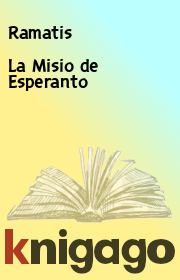 |
| Ramatis - La Misio de Esperanto Жанр: Старинная литература Год издания: 101 |
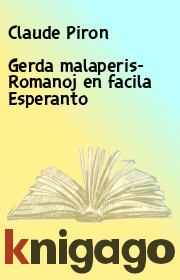 |
| Claude Piron - Gerda malaperis- Romanoj en facila Esperanto Жанр: Старинная литература Год издания: 101 |
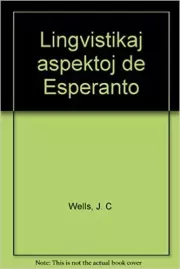 |
| J. C. Wells - Lingvistikaj aspektoj de Esperanto Жанр: Старинная литература Год издания: 1989 |


